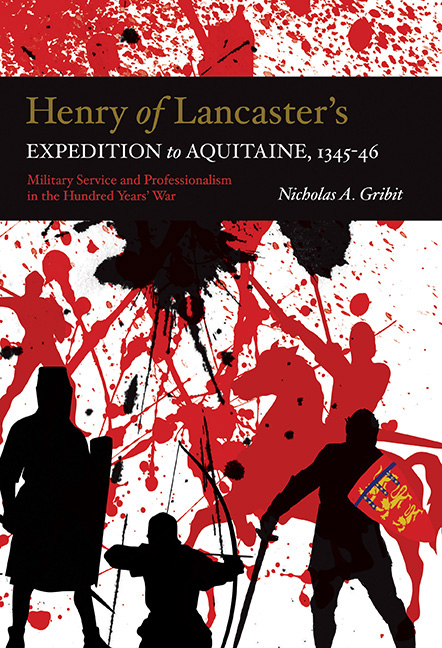 Henry of Lancaster's Expedition to Aquitaine, 1345-1346
Henry of Lancaster's Expedition to Aquitaine, 1345-1346 Book contents
- Frontmatter
- Dedication
- Contents
- List of Illustrations
- Preface and Acknowledgements
- Abbreviations
- Note on Money and Names
- Introduction
- Part I Henry of Lancaster and the English Army: Soldiers, Payment and Recruitment
- Part II The English Expedition to Aquitaine, 1345–46
- Part III Military Service and the Earl's Retinue for War
- 7 Lancaster's War Retinue in 1345: Formation and Structure
- 8 Lancaster's War Retinue in 1345: Cohesion and Stability
- 9 An Era of Military Professionalism: Careers and Patterns of Service
- Conclusion
- Appendix A Transcription and Translation of Lancaster's Indenture
- Appendix B Prosopographical Catalogue of Men in Lancaster's War Retinue, 1345–46
- Bibliography
- Index
- Warfare in History
9 - An Era of Military Professionalism: Careers and Patterns of Service
from Part III - Military Service and the Earl's Retinue for War
Published online by Cambridge University Press: 05 July 2016
- Frontmatter
- Dedication
- Contents
- List of Illustrations
- Preface and Acknowledgements
- Abbreviations
- Note on Money and Names
- Introduction
- Part I Henry of Lancaster and the English Army: Soldiers, Payment and Recruitment
- Part II The English Expedition to Aquitaine, 1345–46
- Part III Military Service and the Earl's Retinue for War
- 7 Lancaster's War Retinue in 1345: Formation and Structure
- 8 Lancaster's War Retinue in 1345: Cohesion and Stability
- 9 An Era of Military Professionalism: Careers and Patterns of Service
- Conclusion
- Appendix A Transcription and Translation of Lancaster's Indenture
- Appendix B Prosopographical Catalogue of Men in Lancaster's War Retinue, 1345–46
- Bibliography
- Index
- Warfare in History
Summary
The study of an English army raised during an important period of transformation in the organisation of war would not be complete without an investigation of the development of professional soldiering. The careers of the most renowned professional soldiers such as the Cheshire knights Robert Knolles and Hugh Calveley have been well documented in both contemporary and modern literature, and there can be little doubt of their single-minded commitment to a martial lifestyle. The task of establishing traits of professionalism amongst less well-known soldiers, however, is more difficult. It is the aim in this final chapter to investigate the extent to which professional soldiering is evident in the retinue of Henry of Lancaster in 1345–46. How many of Lancaster's men should be considered as professionals in warfare, and how many different retinue captains had they previously served under before joining Lancaster's comitiva? The answers to these questions may give an insight into men's attitudes towards warfare and their aspirations to different types of careers in arms during the first half of the fourteenth century. It is important to remember that professional soldiers were not a homogeneous group, as the paths and progression of a military career could vary greatly from one man to the next, and a focus, therefore, on the underlying patterns of service of individuals can often help elucidate the various motivations and campaigning habits of military careerists.
If we broaden the analysis to include military service performed after 1345 then we can also capture the careers of men who were inexperienced and relatively new to the business of warfare at the time of Lancaster's first expedition to Aquitaine. By reconstructing the entire careers of the earl's men, as far as the sources permit, and focusing on those individuals who served on the largest number of campaigns, we can also assess the different types of military professionals that emerged in the fourteenth century. The loyal warrior who might be considered a ‘one household soldier’, for example, who served exclusively with the same retinue leader during his lifetime, was clearly of a different cut of cloth from the roaming careerist or freelance soldier who served in the companies of multiple captains.
- Type
- Chapter
- Information
- Henry of Lancaster's Expedition to Aquitaine, 1345-1346Military Service and Professionalism in the Hundred Years War, pp. 218 - 244Publisher: Boydell & BrewerPrint publication year: 2016


